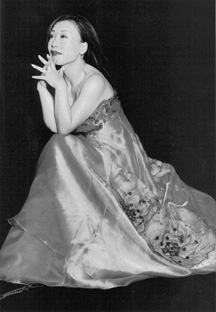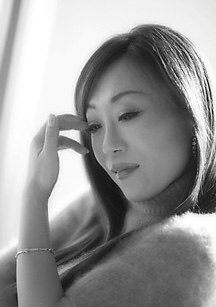Sumi Jo: Devoted to Music by Wah Keung Chan
/ May 10, 2004
 In 1988, when Korean coloratura soprano Sumi Jo
recorded Oscar with Herbert von Karajan in Verdi's Un ballo in maschera,
she became the first Asian opera singer to make it big in the West. The 42
year-old has become a prolific recording artist and an inspiration for a new
generation of Asian singers, her 2000 crossover album having sold over 1 million
copies. In 1988, when Korean coloratura soprano Sumi Jo
recorded Oscar with Herbert von Karajan in Verdi's Un ballo in maschera,
she became the first Asian opera singer to make it big in the West. The 42
year-old has become a prolific recording artist and an inspiration for a new
generation of Asian singers, her 2000 crossover album having sold over 1 million
copies.
LSM: How did your Korean background influence
your development as a classical musician and singer?
SJ: I was born in Seoul, Korea, and I
went to Seoul National University for two years. In 1983 I left for Italy, as it
is the country of bel canto and opera. I also wanted to experience European
culture.
My mother had wanted to be a singer, but the
political situation in Korea wasn't conducive to studying music. She always
dreamt she would have a daughter who would become a singer. During her pregnancy
she always listened to soprano arias and classical music, so it is so natural
for me... When I was four years old I started piano lessons and continued until
I was 18. I was singing when I was five or six, but really started singing
seriously when I was 11. I tried to imitate the voices of Callas and Joan
Sutherland. My heart was full of music and my mother played classical music
around the clock. Lots of people say that when I sing they feel so good and
happy.
LSM: Was there any pressure from your mother
to be a singer, to excel in classical music?
SJ: Three or four times I tried to run
away from home because it was very hard for me to play the piano eight hours a
day. I only understood all her effort and ambition when I went to Italy and
realized that even if you have talent, it's not enough: to be a professional, a
real musician, you have to spend a lot of time with yourself and with the
scores. Now I thank my mother for teaching me that the music world is
tough.
LSM: Tell us about your vocal
training.
SJ: I had several good Korean voice
professors, but I met my best teachers, like Elizabeth Schwartzkopf and Carlo
Bergonzi, when I was in Europe. I learned a bit from each person--breathing,
Italian repertoire, the bel canto, German lieder. You have to figure out what
the best thing is that each instructor can teach you. The most important
experience for me was to work with great conductors like von Karajan, Maestro
Solti, Lorin Maazel and Zubin Mehta. It's like working a whole year alone. The
inspiration and preparation that they transfer to you is just
incredible.
LSM: What exactly did you learn that made you
better?
SJ: Our body is our instrument.
Everybody has a different body and a different way of producing sound. I had to
find a new method for myself--it took me at least three years to understand
that. Before I went to Italy I was sort of a mezzo-soprano. My highest note was
C and my repertoire was sort of lyric. I met a very good professor in Santa
Cecilia Conservatory who was a mezzo-soprano, but she told me at my very first
lesson that I was a coloratura soprano.
I asked her how it was possible, since I didn't
have any high notes; she couldn't even show me because she had no high notes
either. She was convinced that I could be Queen of the Night, sing the Tales
of Hoffmann, all the coloratura repertoire. Slowly, I followed her
instructions and practiced different ways of breathing, but it took three years
of hard work, studying books and observing other singers. One beautiful morning
I started practising Queen of the Night and sang a high F perfectly. I finally
understood how to use my body, how to breathe correctly to make these almost
impossible sounds.
When I produce the high notes, even I am not sure
the sounds are in the right key because I can only go by the physical sensation
that I'm doing it right. When I'm singing the Queen of the Night, my life can be
quite miserable, as singing high Fs perfectly is not very comfortable for me. It
makes me nervous.
When I became a professional singing the coloratura
repertoire, my life became very disciplined because everyone, including myself,
expected perfection every time. I do lots of sports, eat properly, and treat my
body and mind with respect so that it is a good instrument. I want to be a
beautiful artist and not just make a beautiful sound.
You have to be careful of repertoire. After my
first recording with von Karajan in Ballo he told me that he wouldn't
mind recording a Norma with me. At that time I was just 25 and still in
transition to a light soprano, but the maestro was convinced that with
technology in the recording studio he could make me an incredible Norma. I knew
making another recording with him would make me more famous and pay more, but I
said no because I knew I should never sing this repertoire. He was very
disappointed but he understood.
LSM: Are Asian singers more popular in Europe
now?
SJ: Europe is still very
conservative--it is not very easy for Asians or black American singers. Most
Asians are doing Butterfly. It's a shame. I am very lucky because I am a
coloratura and there are not many good coloratura singers in Europe. When I
first came here, I lived with an Italian family for three years to learn their
habits and their way of living. I was curious to learn new things, try new food
and cuisine, experience European culture. I was able to adapt. Some Asians had
difficulty doing this.
LSM: You are one of the first Asian singers
to have a major career. Do you have any advice for the next generation of Asian
singers?
SJ: What happened to me can happen to
anybody. If you are prepared, have talent, good character, charisma, and are
professional, there will be lots of occasions to show your
ability.
LSM: Tell us about your Toronto
recital.
SJ: There will be songs and some
opera. When I do a recital I like to show different styles, like a musical
journey.
Favourite Opera singers
Maria Callas, Joan Sutherland, Kiri Te Kanawa,
Kathleen Battle
Favourite Musical Works
La Bohème
Mahler 4th and 8th
Symphonies
Concert
Sumi Jo at
Roy Thomson Hall, Toronto
May 9, 2004. (416)
872-4255
| 

